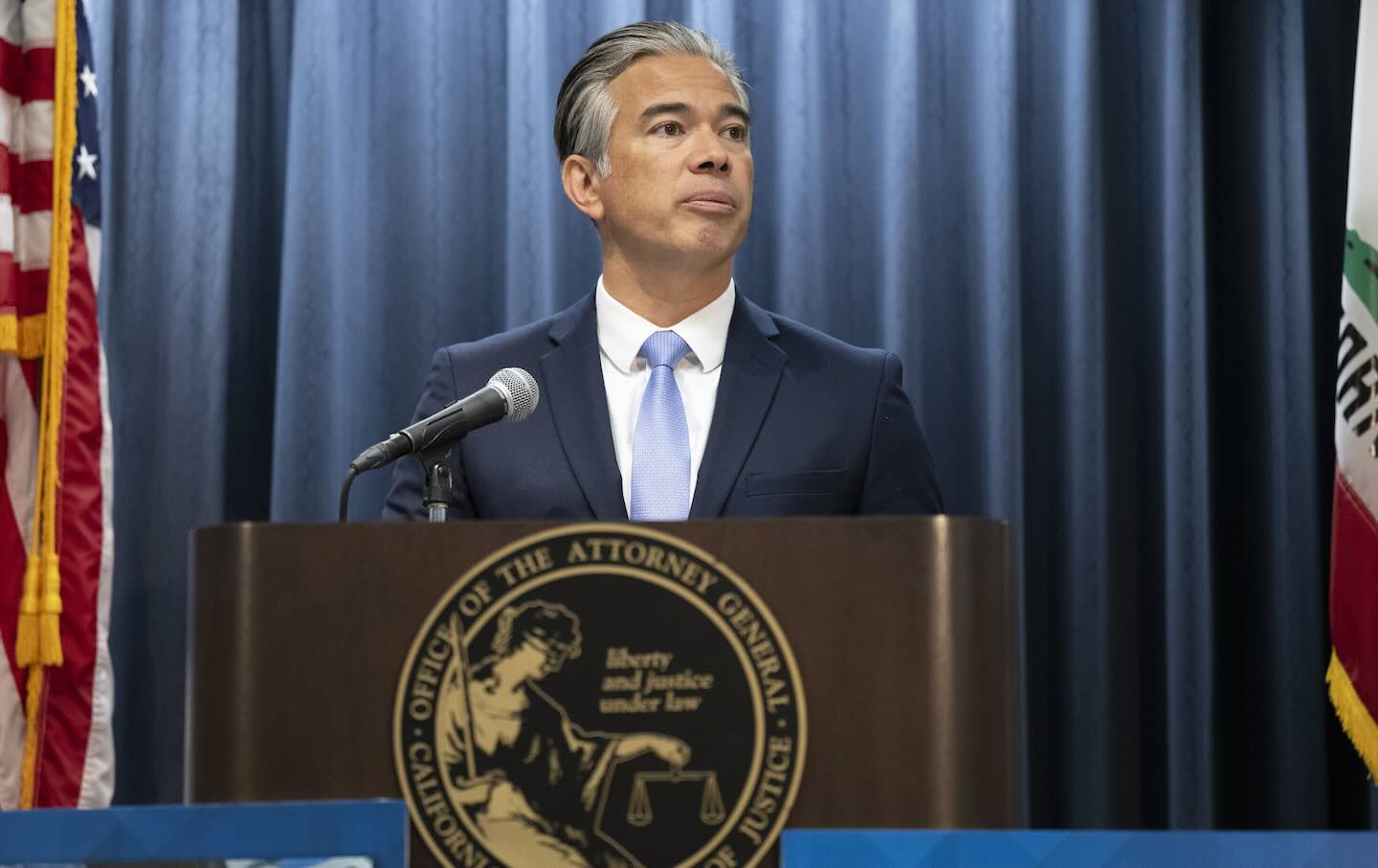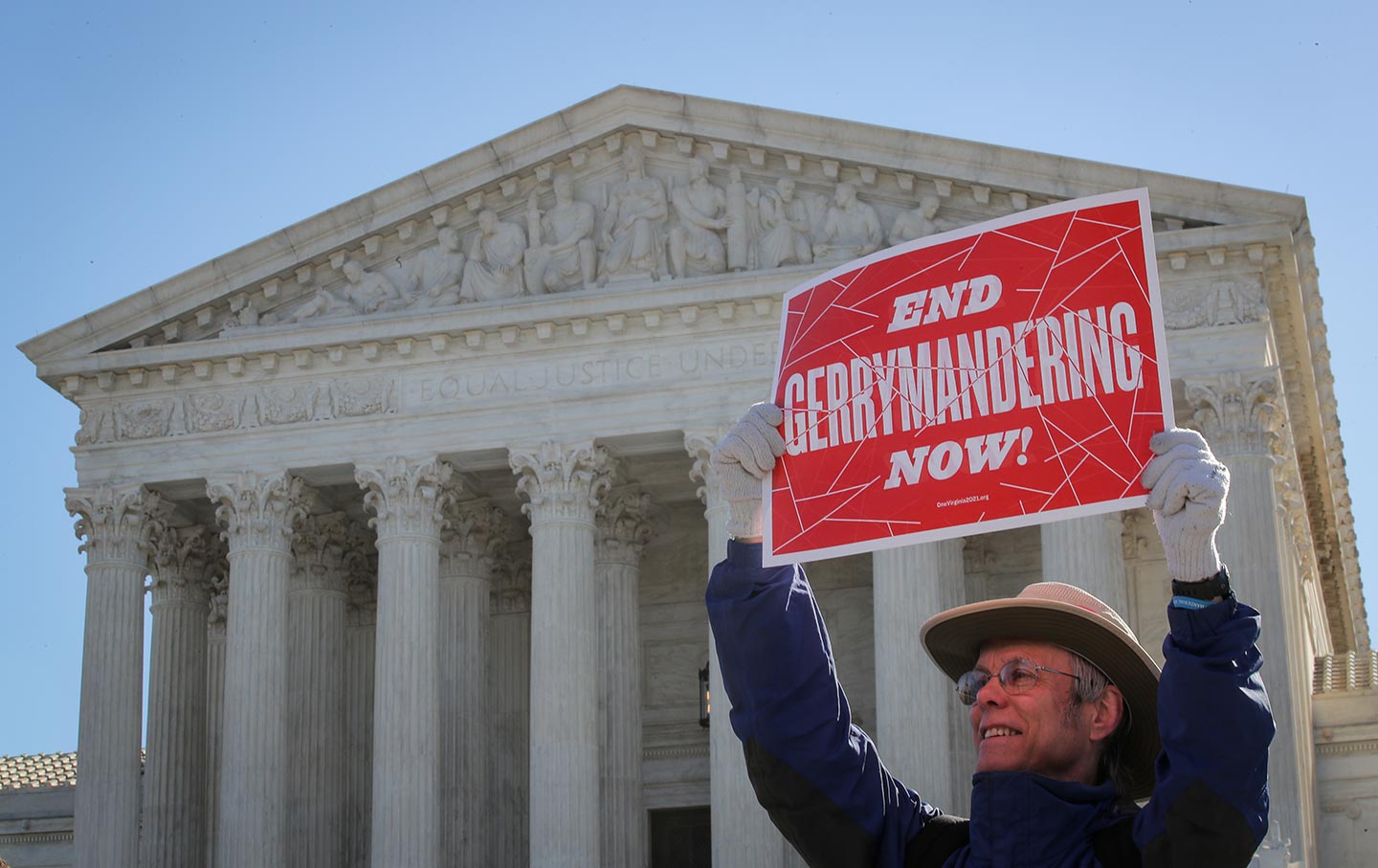California Is Ready to Go Toe to Toe With Trump 2.0
“We’ve thought about all the possibilities, and have prepared for every one of them,” said AG Rob Bonta, “and are ready to take action when there’s any unlawful activity.”

California Attorney General Rob Bonta speaks during a press conference in Los Angeles.
(Hans Gutknecht / MediaNews Group / Los Angeles Daily News via Getty Images)
On the campaign trail, Trump leaned into classic fascist language to promise a historically unprecedented mass deportation campaign against immigrants who he claimed were “poisoning the blood of the nation.” The deportation effort, levied against more 13 million undocumented immigrants and their children, would be a “bloody story,” he said with glee. It would involve constructing huge detention camps and sending US troops into communities to round up migrants.
Such is the enormity of his campaign promise that the Americans who voted for him likely discounted it, seeing it mostly as bluster designed to jump-start reform of a dysfunctional immigration system.
Turns out it wasn’t bluster. Trump’s team is making truly extraordinary plans, which it is trumpeting far and wide.
Trump’s team aims to use executive orders and emergency declarations to eviscerate the principle of birthright citizenship, by denying Social Security numbers and passports to children born on US soil to undocumented immigrants; to revoke the legal status of 700,000 people in the country on Temporary Protected Status, more than 60,000 of whom live in California; to invoke the 1798 Alien Enemies Act to round up supposed gang members for summary deportation; to start building huge detention facilities throughout America; and to activate the US military on US soil—almost certainly in violation of the Posse Comitatus Act—as well as deputizing local law enforcement agents to hunt down immigrants. Much of this agenda will be launched, via a flurry of executive orders, on day one of the new administration.
There’s also discussion about federalizing the National Guard and withholding federal funding from states, like California, that don’t cooperate with these plans.
The scale, cruelty, and economic madness of what is about to unfold, with the imprimatur of roughly half of the American voting public, is now coming into focus. It ought to horrify any sober-minded, constitutionally minded American. And, in the four big states of California, Texas, Florida, and New York, in particular, it should send shivers down the spine of anyone seriously analyzing what this will mean for their local and state economies, labor, and housing markets.
As the Los Angeles Times recently reported, if implemented as planned, mass deportation could shrink the national economy by $1 trillion per year and leave millions of children without parents to raise them, with much of that pain concentrated on the Golden State.
Nationally, one in 20 households—6 million—have at least one undocumented family member, according to Pew Research Center. Four million kids have at least one undocumented parent. If these parents are all deported, or even if just a significant number are, the damage to the lives of these families will be incalculable.
Pew estimates there are 1.8 million undocumented immigrants in California, closely followed by Texas, with 1.6 million. In 2022, Pew estimated that 7 percent of California’s workforce was undocumented. That wasn’t the highest in the country: Florida, New Jersey, and Texas all have a slightly higher percentage of undocumented in the workforce. All stand to suffer vast economic disruption if these workers are yanked out of jobs overnight.
There are more than 180,000 DACA recipients in California, many of them enrolled in universities. Until Trump came along, there was a bipartisan understanding that these young people should be allowed to remain in the United States. Trump’s immigration advisers, led by the truly odious Stephen Miller, have scrapped this consensus.
In Los Angeles, upwards of one-quarter of construction industry workers are undocumented, as are 17 percent of manufacturing workers, 16 percent of wholesale trade employees, and 15 percent of retail trade employees. Remove them from the workforce, and housing prices, in particular, will soar as new construction slows to a crawl.
But by far the biggest hit will be in agriculture, where UC Merced’s Farmworker Health Study estimates that fully three-quarters of workers are undocumented. Bring out the military against these workers, and California’s agricultural economy will grind to a halt, with utterly calamitous impacts on America’s food supply chains. The American Business Immigration Coalition is reporting that farmers—many of whom likely voted for Trump—are already in a panic over the incoming administration’s plans.
Not surprisingly, California’s political leaders, as well as grassroots immigrants’ rights groups, such as CHIRLA, and legal teams who were already working to expand pro bono representation for immigrants, have been strategizing for the better part of a year as to how to push back against Trump’s potential second term. In particular, they have been considering how to strengthen SB 54, the 2017 law known as the California Values Act, which blocks local and state law enforcement agencies from, in most circumstances, cooperating with federal immigration authorities.
“As attorney general, I’ve been preparing and readying for this possible moment for months, and in some case years, depending on the topic,” California’s Attorney General Rob Bonta told me on Tuesday. “[I’ve] been working with other Democratic attorneys general across the nation for months; with advocates and experts in each of the policy areas, including immigration.”
Popular
“swipe left below to view more authors”Swipe →Bonta believes that Trump’s previous track record shows “an incredible capacity to break the law,” and he argues that it now falls to California and other blue states to push back as aggressively as possible, through filing one lawsuit after another aimed at putting the brakes on policies that, once again, veer into illegality.
If state resources are unlawfully commandeered by the Feds, California stands ready to sue. If the Feds justify these acts by declaring the country to be facing an “emergency,” California will sue. If rights of access to citizenship papers and public benefits are stripped from legal citizens and legal residents, again, California’s Department of Justice is ready to head to court.
“They want to do what they want, when they want, how they want it, even if it violates the Constitution or a federal statute,” Bonta says. His team is, he admits, worried about “the harm that will be visited on Americans, including Californians, that will be the result of unlawful activity and, in the immigration space, xenophobia, racism, discrimination, fearmongering, scapegoating.”
UCLA law school professor and faculty codirector of the Center for Immigration Law and Policy Ahilan Arulanantham, who was at the forefront of many of the lawsuits filed against Trump policies from 2017 to 2020, wrote back in June that California was preparing to sue a Trump 2.0 administration on violations of the Fourth Amendment and on grounds of creating policy based around racial discrimination.
Now, he told me in a conversation on Wednesday, California’s legislators, whom Governor Gavin Newsom called into special session to Trump-proof the state to the maximum extent possible, need to beef up SB 54, further limiting when and how law enforcement agencies can cooperate with the Feds. They need to strengthen data privacy laws to make it much harder for the Feds to access the names and addresses of undocumented residents who have received drivers’ licenses, qualify for health insurance under Medi-Cal, receive in-state tuition from public universities, or are permitted to take on-campus jobs at those universities. And, he argued, the state should explicitly codify the right of Dreamers, and others at risk of losing their legal status and work permits overnight, to work for state agencies, as well as develop ways to generate ID documents for US-born children denied Social Security numbers and passports so that they can continue to work, to open bank accounts, and to travel within the US.
Attorney General Bonta’s team is ready to go toe to toe with Trump 2.0. “I don’t like bullies,” California’s top law enforcement officer explains. “I don’t like people who abuse their power to harm other people. And that is where we come in—to protect and defend those people from the abuses and the unlawful conduct of abusers of power.”
During Trump’s first presidency, California filed more than 100 lawsuits against the administration and won more than 80 percent of them. This time around, says Bonta, “we’ll be stronger. We’ll be ready for the things that they’ve signaled and telegraphed that they will do. We’ve thought about all the possibilities, and have prepared for every one of them, and are ready to take action when there’s any unlawful activity.”
Disobey authoritarians, support The Nation
Over the past year you’ve read Nation writers like Elie Mystal, Kaveh Akbar, John Nichols, Joan Walsh, Bryce Covert, Dave Zirin, Jeet Heer, Michael T. Klare, Katha Pollitt, Amy Littlefield, Gregg Gonsalves, and Sasha Abramsky take on the Trump family’s corruption, set the record straight about Robert F. Kennedy Jr.’s catastrophic Make America Healthy Again movement, survey the fallout and human cost of the DOGE wrecking ball, anticipate the Supreme Court’s dangerous antidemocratic rulings, and amplify successful tactics of resistance on the streets and in Congress.
We publish these stories because when members of our communities are being abducted, household debt is climbing, and AI data centers are causing water and electricity shortages, we have a duty as journalists to do all we can to inform the public.
In 2026, our aim is to do more than ever before—but we need your support to make that happen.
Through December 31, a generous donor will match all donations up to $75,000. That means that your contribution will be doubled, dollar for dollar. If we hit the full match, we’ll be starting 2026 with $150,000 to invest in the stories that impact real people’s lives—the kinds of stories that billionaire-owned, corporate-backed outlets aren’t covering.
With your support, our team will publish major stories that the president and his allies won’t want you to read. We’ll cover the emerging military-tech industrial complex and matters of war, peace, and surveillance, as well as the affordability crisis, hunger, housing, healthcare, the environment, attacks on reproductive rights, and much more. At the same time, we’ll imagine alternatives to Trumpian rule and uplift efforts to create a better world, here and now.
While your gift has twice the impact, I’m asking you to support The Nation with a donation today. You’ll empower the journalists, editors, and fact-checkers best equipped to hold this authoritarian administration to account.
I hope you won’t miss this moment—donate to The Nation today.
Onward,
Katrina vanden Heuvel
Editor and publisher, The Nation
More from The Nation

The King of Deportations The King of Deportations
ICE’s illegal tactics and extreme force put immigrants in danger.

How Rob Reiner Tipped the Balance Against Donald Trump How Rob Reiner Tipped the Balance Against Donald Trump
Trump’s crude disdain for the slain filmmaker was undoubtedly rooted in the fact that Reiner so ably used his talents to help dethrone him in 2020.

The Economy Is Flatlining—and So Is Trump The Economy Is Flatlining—and So Is Trump
The president’s usual tricks are no match for a weakening jobs market and persistent inflation.

Trump’s Vile Rob Reiner Comments Show How Much He Has Debased His Office Trump’s Vile Rob Reiner Comments Show How Much He Has Debased His Office
Every day, Trump is saying and doing things that would get most elementary school children suspended.




